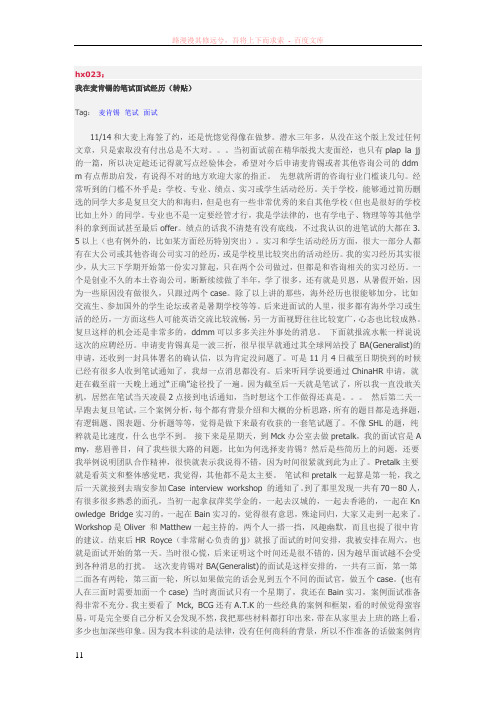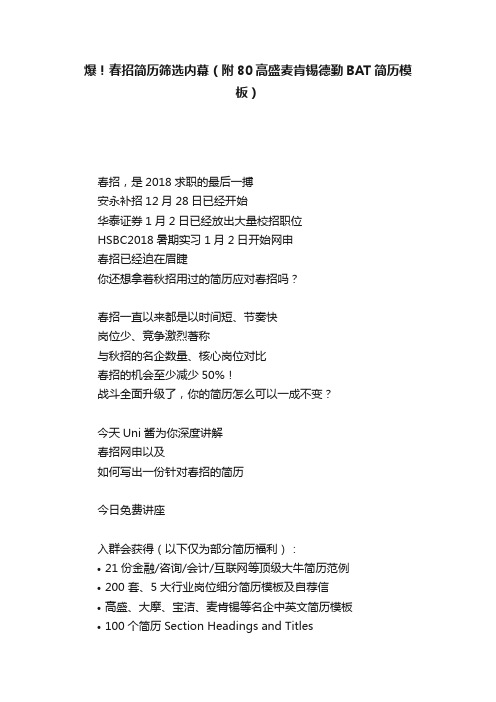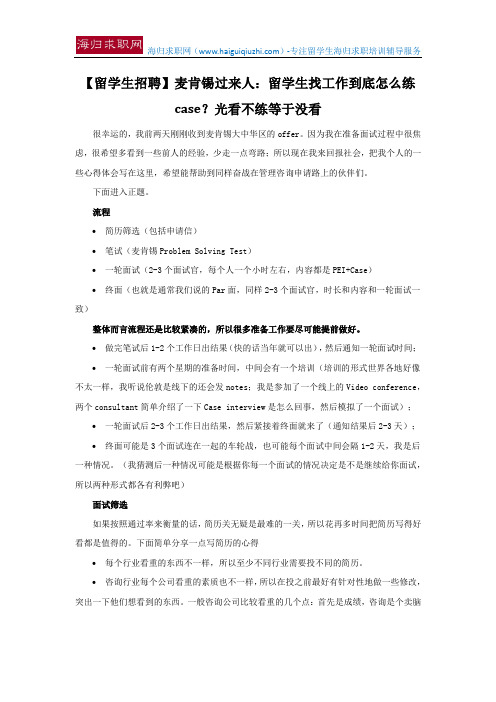麦肯锡简历指导
麦肯锡求职指南!

麦肯锡求职指南!作为咨询公司的龙头老大,有很多同学都对麦肯锡心向往之。
因而,经常有很多想进咨询行业的人询问- “麦肯锡的招聘要求是什么?”“麦肯锡的工作风格是什么样的?”“我是XXX行业的,转行进麦肯锡对我以后的职业发展怎么样?”......我们把这些常见问题记录了下来,并从麦肯锡官网找到了官方答案。
最后总结整理成了一篇关于麦肯锡招聘&职业发展的完整版干货,想申麦肯锡的同学们可以收藏起来啦!申请麦肯锡的常见问题Q1:麦肯锡的职业路径是怎么样的?麦肯锡是一个non-hierarchical的组织,组织扁平化。
职业路径如下:Business Analyst - Associate - Engagement Manager - Associate Partner - Partner在麦肯锡,顾问是根据绩效而不是背景或任期来晋升的。
因此,如果表现良好将考虑提早晋升。
Q2:如果我要申请generalist consulting position,在学历背景和工作年限上有什么要求?如果你正在攻读硕士学位,并且获得的本科学位少于4年,那么你将被考虑担任business analyst的职位。
如果你拥有学士学位并且具有至少4年的工作经验,或者你在获得学士学位后的4年内已经完成或希望完成硕士课程,那么你将考虑作为associate加入。
Q3:一定要有商业背景才能进入麦肯锡吗?无需具备商业背景即可尝试申请麦肯锡。
麦肯锡顾问中有超过三分之一的人没有business degree,约有一半的人不是MBA.Q4:通过校招进入麦肯锡有什么需要知道的?•如果我有兴趣申请特定的麦肯锡业务,是否有单独的申请流程:不,只有generalist或者practice preferences的申请。
提交申请时,你可以选择列出最多四个办公室惯例首选项。
•如果我申请暑期实习但未被选中,还能在麦肯锡申请全职职位吗:可以。
如果对实习生对麦肯锡的全职工作感兴趣,麦肯锡希望在秋招收到所有实习生的来信。
超级有用的麦肯锡简历标准ResumeCVguidance

What we look for in a resume/CVOur resume/CV reviewers look for evidence of achievement in the four key skill areas outlined in what we look for. We find the following resume/CV information and structure most helpful in giving you a fair review:EducationWe prefer to see details of graduate work and college/tertiary education first. Include your degree subject, university, degree grades, or GPA at each major milestone of your course (for example, magna cum laude overall, summa cum laude in first year) and any major prizes or awards, specifying key dates. You should also include any significant academic projects (e.g., senior thesis, major research work, etc.) that you feel help illustrate your academic ability.Depending on your national background, it may be important that you provide details of your results in all subjects in key examinations (e.g., high school diploma, ‘A' levels, baccalaureate grades).Applicants who have taken standardized tests such as the GMAT, LSAT, SAT, etc. should also include their scores. Providing as much detail as possible here is key. If you have academic transcripts showing detailed grades, send us a copy. If you studied in an academic system unfamiliar to most, try where possible to translate your result to help the reviewer understand (e.g., top two percent of students nationally).Work experienceIf you have work experience, emphasize what you have achieved in each major role beyond your key day-to-day responsibilities. We are most interested in the impact you have had in your career (e.g., the key things that changed because of your direct involvement). You may also describe unique skills and experiences that will help us understand the strengths you bring to the table.Other skills and achievementsWe are interested in any volunteer or charity work, or positions of responsibility in professional bodies – particularly where they demonstrate leadership, initiative-taking, or extraordinary commitment.Similarly, you should include leadership positions, significant involvement in extracurricular activities, and significant participation in sports, games, societies, or hobbies. For example, a high level of achievement in a sport tells us something about your commitment and drive to achieve. Don't just tell us about your hobbies; tell us what you have achieved in pursuing them.Generally you should only include items that you feel will help us understand your strengths better (rather than including something just for the sake of having it). LanguagesInclude any foreign languages for which you have business conversational ability or better. For languages, a good idea is to rate yourself as either basic, competent, or fluent. Writing and layoutTips for resume writing and layoutWe advise you to tailor your resume/CV to the employer you are sending it to, but here are some broad tips on the overall layout of a good resume/CV:•Your resume/CV should be neatly typed and clearly laid out.•Use a reasonably sized font (e.g., size 10 or larger) and allow some margin around the text for reviewer’s notes.•Do not be overly creative with the formatting—it will only distract from the real focus of the document, which is you.•Write clearly and don’t forget to check your grammar and spelling.•Include your name and contact details at the top, with daytime and evening phone numbers and an e-mail address.•Lay out your prior jobs (if any) in reverse chronological order, with your most recent role at the top.•It is best to list dates on the left hand side. You should be able to explain any gaps in your career or educational history.•The length of your resume/CV will depend on you and your achievements—but don’t pad it out! The trick is to be concise, but not incomplete.Remember, the person reading your resume/CV may not be familiar with your specific credentials. Avoid using any jargon. Ask friends from different backgrounds to read it for you. If they're impressed without being confused, you're looking good.The first part of the candidate screening process at McKinsey is a resume review. We use a resume to help us determine whom to invite to our interviewing process. Therefore, it is important for your resume to be the best possible reflection of you and of your achievements to date.Your resume should not only accurately reflect your achievements to date, but also provide some sense of the scale of those achievements. A successful resume will also give the reader a sense for who you are as a person, as reflected in the activities and achievements you view as important in your life.To help illustrate some of the points above, take a look at an example of a poorly written resume/CV.How to write a successful CV before applying for a jobGetting a CV up to scratch is an important part of the job searching processContinue reading the main storyA good curriculum vitae - or CV - is vital when looking for work,especially when there are numerous candidates for the same job, so what should it contain?There is no perfect template, and each sector may require a differentemphasis on a different aspect of the content, such as career history orqualifications.However, experts suggest there are some basic rules on how a CV should be written and the information that should be included.Overall, a CV should be neat and typed if possible. Most libraries now have public computers, if you do not have your own.It should also be short, usually no more than two sides of A4. It should be positive, stressing achievements and strengths, and make a good impression in a clear and positive way.The basic format for a CV includes:•Personal details, including name, address, phone number, email address and possibly any professional social media presence. You no longer need toinclude your date of birth, owing to age discrimination rules•Career history, starting with your most recent job first. Include dates and temporary or voluntary jobs if appropriate• A personal profile which sells yourself and your qualities, tailored towards the job you are applying for•Achievements from previous jobs that are relevant•Qualifications and training from previous jobs, with the most recent first •Interests, if they are relevant and especially if the skills or teamwork concerned are relevant for the job•Any extra information, such as reasons for a career change or reasons for gaps in career history, such as caring duties•References, ideally two or more and including a recent employer Corinne Mills is managing director of Personal Career Management, which offers careers coaching. She says that a straightforward font and formatting is required - and the spelling must be checked and checked again."Poor spelling is the quickest way of getting a rejection," she says.She adds that people should check five or six adverts for a particular job and then use the common requirements to mould their CV."Many people think that one CV will fit all applications, but it needs to be a very targeted document for the role they are going for. Do some research so you understand what employers are looking for."Careers Wales has bi-lingual advice covers all these areas and also includes help for jobseekers under 19.Global tipsCVs can be produced in a different format for job applications outside of the UK.For example, the equivalent of the CV in the US is the "resume".This has much the same aims by outlining job talents, work history, education and career goals, as well as how a candidate's experience and skills would be suited to the job being advertised.One guide to writing resumes and cover letters is on the New York State Department of Labor's website.。
麦肯锡入职培训第一课:让职场新人一生受用的逻辑思考力

4.2跳出自己 进行思考
4.3想不出点 子,是因为 “没有进行 逻辑思考”
4.4越独特的 想法,越需 要逻辑思考
5.2培养“批判性 +逻辑性”的笔记
术
5.1不能只靠逻辑
5.3为什么年轻人 创业总是会败得很
惨?
5.4写出让自己思考 “顺利进行”的脚本
5.5通过脚本法来 “预见未来”
5.6省下时间去做真 正有用的事
作为入职新人的入门课程,可以快速浏览一遍。
飞机上一目十行,除了“批判性思维”和“逻辑思考”没什么实质性内容,真的好无聊一思考(通过深刻洞察来得出自己的想法)和逻辑性展开(用简单易懂的方式 表达)。逻辑思考的基本要点,就只是这两点。
Step1亲自确认前提条件(这是真的吗?)Step2深入查证(……所以会这样)Step3持有属于自己的意见 (这个不错)
·在说什么(主题·论点)·想说什么(结论·内容)·这么说的理由是什么(证据)·必须要做的是什么 (行动)
无论什么时候,眼前发生的都不一定是全部的真相,背后一定有其背景。留心思考这方面也能够培养“逻辑 思考”。
①明确目的是什么②明确思维模式框架③不断发问(所以呢?为什么呢?)
重要的不是要掌握多少数据和方法,而是要有创造性、逻辑性地找到“现在眼前发生的真正问题是什么”。
目录分析
1.2 “逻辑思考” 究竟有什么用?
1.1没有香气的咖 啡豆是不会吸引人
的
1.3逻辑思考和天 生的好头脑没有关
系?
1.5目标不是我的 价值(My Value),
而是我们的价值 (Our Value)
1.4越会工作的人, 越重视对人的“逻
辑思考”
1.6真正的逻辑思 考,会改变大家的
行动
我在麦肯锡的笔试面试经历(转贴)

hx023:我在麦肯锡的笔试面试经历(转贴)Tag:麦肯锡笔试面试11/14和大麦上海签了约,还是恍惚觉得像在做梦。
潜水三年多,从没在这个版上发过任何文章,只是索取没有付出总是不大对。
当初面试前在精华版找大麦面经,也只有plap la jj 的一篇,所以决定趁还记得就写点经验体会,希望对今后申请麦肯锡或者其他咨询公司的ddm m有点帮助启发,有说得不对的地方欢迎大家的指正。
先想就所谓的咨询行业门槛谈几句。
经常听到的门槛不外乎是:学校、专业、绩点、实习或学生活动经历。
关于学校,能够通过简历删选的同学大多是复旦交大的和海归,但是也有一些非常优秀的来自其他学校(但也是很好的学校比如上外)的同学。
专业也不是一定要经管才行,我是学法律的,也有学电子、物理等等其他学科的拿到面试甚至最后offer。
绩点的话我不清楚有没有底线,不过我认识的进笔试的大都在3. 5以上(也有例外的,比如某方面经历特别突出)。
实习和学生活动经历方面,很大一部分人都有在大公司或其他咨询公司实习的经历,或是学校里比较突出的活动经历。
我的实习经历其实很少,从大三下学期开始第一份实习算起,只在两个公司做过,但都是和咨询相关的实习经历。
一个是创业不久的本土咨询公司,断断续续做了半年,学了很多,还有就是贝恩,从暑假开始,因为一些原因没有做很久,只跟过两个case。
除了以上讲的那些,海外经历也很能够加分,比如交流生、参加国外的学生论坛或者是暑期学校等等。
后来进面试的人里,很多都有海外学习或生活的经历,一方面这些人可能英语交流比较流畅,另一方面视野往往比较宽广,心态也比较成熟。
复旦这样的机会还是非常多的,ddmm可以多多关注外事处的消息。
下面就报流水帐一样说说这次的应聘经历。
申请麦肯锡真是一波三折,很早很早就通过其全球网站投了BA(Generalist)的申请,还收到一封具体署名的确认信,以为肯定没问题了。
可是11月4日截至日期快到的时候已经有很多人收到笔试通知了,我却一点消息都没有。
让你的简历讲故事_简历知识_模板

让你的简历讲故事_简历知识_模板范文先生网收集的个人简历相关资料。
谢谢浏览!简历所说的故事并非狭义的“很久很久以前,我生于某地”这样的个人传记,而是你怎样通过你的设计,让人看出你的人生轨迹来,以及它与你申请职位之间的联系。
前麦肯锡公司沟通专家、管理顾问德蕾莎.伍德兰(Teresa Woodland)曾为诸多管理顾问的简历设计(提交给客户)提供指导。
我最近与她谈到了简历的写作时,她说:“不要只写你在某个职位上所作的事,而强调你的影响(impact)是什么。
”伍德兰说:“写简历的时候,你必须问自己:你留下了什么传统?你的故事是什么(What is your story?)”寻找一个属于你的故事,这就是在你的经历当中,梳理出一个脉络出来,让你的经历不再是一堆零散的连缀,而是一个不断发展的情节,你是一个发展中的主角。
很多人在简历中只是记流水账般,列举自己的职位和工作职责,比如“领导一支三个人的销售队伍”。
伍德兰反问:“你领导这三个人都做成了些什么事?”你不说,别人怎么知道你带着三个人是一年内销售了一个亿的产品呢,还是打了一年的牌呢?另外一个好办法,就是突出升职、换岗、获奖这些“里程碑”式的事件。
如果这些事件串起来,很可能就你这个人说清楚了。
但是,一些过于久远的“光辉业绩”,比如你在中学阶段获得获得钢琴比赛第一名,你被当地报纸誉为神童,雇主或许并不关心,即便它是你最值得骄傲的背景之一。
作者:南桥,美国马歇尔大学课程设计师,英国《金融时报》中文网特约撰稿人地球上的每一份工作都需要简历。
如果不在寄出简历前仔细地检查你的简历,那你的简历就会很有可能被扔进废纸箱。
在你寄出的简历之前,用“九不”标准来检查一下你的简历。
1、简历的修饰。
不要因为省钱而去使用低廉质粗的纸张。
检查一下是否有排版、语法错误,甚至咖啡渍。
在使用文字处理软件时,使用拼写检查项并请你的朋友来检查你可能忽略的错误。
2、字符大小。
如果你需要用二页纸来完成简历,请清楚、完整地把你的经历和取得的成绩表现出来。
麦肯锡的职业生涯

别把你的20多岁浪费给谷歌和麦肯锡PK我把20岁献给谷歌麦肯锡,怎么了?在你二十几岁的职业生涯里最该追寻的什么?赚大钱?或者是设法给简历里加上一个大公司的经历?事实上你最该寻求的,是找到自己的职业方向。
正如白手起家的企业家吉米罗恩(Jim Rohn,美国杰出的商业哲学家)曾说过的: “时间是我们最宝贵的资产,但是我们却浪费时间,打发时间,而没有去投资时间。
”在二十几岁时明智投资你的时间,那么之后你可以尽早从事自己所喜爱的事情,而不是在心里怀疑自己可能会喜欢什么。
所以你该问自己的真正问题是:我要如何在有限时间内最大程度地了解自己?自己对什么会产生真正的兴趣?然后,你才知道自己需要实现什么职业目标,知道自己想要成为什么。
针对这个问题——你不该去一家大型科技公司工作。
不幸的是,要做到这个还挺不容易。
像谷歌这样的大型科技公司会实行校园招聘,你一出校门可能就会直接进了这些公司。
薪水可观,福利看起来很诱人(免费的食物提供,还有机会见到希拉里克林顿或者波诺之类的名人),品牌也十分具有吸引力。
你不少朋友也在这样的公司工作,所以在某种程度上也形成一个圈子,有社会舒适度。
这样的工作机会看起来像清晰的台阶,能够领你到其他许多地方。
问题是,你的学习曲线增长其实慢得令人难以置信。
如果你是一个工程师,你大多会为一个大型项目工作,而这个项目很可能和个人业务成果无关。
如果在这样的公司里你是一个产品经理,你不会像一个真正产品经理一样面对重要的挑战(在缺乏各方条件的境况下创建出一种无比优秀的产品)。
如果你是一个销售人员,你不会清楚你的业绩到底是归功于你的努力还是只是品牌本身。
从根本上来讲,你的学习曲线很慢,进步也很慢。
就算你培养了一定能力,能够引导大型组织或者处理好人际沟通,这也并不能推动你去发掘智力和情感的最大潜能。
问问自己这样一个问题:我的加入能给这家大公司的前景带来改变么?答案是否定的。
同时你学到的东西都显得不太起眼。
最终的结果可能是,你可能稍微赚的多一点,但是却不太了解自己,相比你在创业公司或成长型公司里工作的朋友们,你可能已经落后不少了。
爆!春招简历筛选内幕(附80高盛麦肯锡德勤BAT简历模板)

爆!春招简历筛选内幕(附80高盛麦肯锡德勤BAT简历模板)春招,是2018求职的最后一搏安永补招12月28日已经开始华泰证券1月2日已经放出大量校招职位HSBC2018暑期实习1月2日开始网申春招已经迫在眉睫你还想拿着秋招用过的简历应对春招吗?春招一直以来都是以时间短、节奏快岗位少、竞争激烈著称与秋招的名企数量、核心岗位对比春招的机会至少减少50%!战斗全面升级了,你的简历怎么可以一成不变?今天Uni酱为你深度讲解春招网申以及如何写出一份针对春招的简历今日免费讲座入群会获得(以下仅为部分简历福利):•21份金融/咨询/会计/互联网等顶级大牛简历范例•200 套、5大行业岗位细分简历模板及自荐信•高盛、大摩、宝洁、麦肯锡等名企中英文简历模板•100个简历Section Headings and Titles•600 简历必备Action Verbs一、春招网申要做到:快准狠快一般春招的高峰期是3月-4月,但是,2017年春招来得比往年更早,在1月初就有最早开放的春招网申通道了!•网易游戏在2017.1.1开始春招。
•完美世界在2017.1.2开始春招。
•2017年3月中旬已经有超过百家企业截止了网申。
根据2018届秋招形势的预测(秋招提前了一个月),春招可能也会有提前的趋势!准春招的企业少,岗位少,时间又不确定。
所以在网申投递简历的时候一定要有针对性,避免让HR觉得你不知所云。
一定要让HR感觉到你是早有准备的。
2018年的春招企业大多集中在国有银行、券商等,所以如果将重点放在这些种类上,认真研究招聘企业的特色,才能兵来将挡,不打无准备之战。
狠要狠抓简历和面试技巧。
春招就两关:简历关和面试关。
闯过了就有Offer,闯不过就失业!春招的简历要如何有针对性地准备?第一步就是抓住简历关键词。
二、春招简历5个关键词1你是不是Target School?每个HR设计的简历系统都有学校过滤功能,招聘时也是手拿target school list筛选。
【留学生招聘】麦肯锡过来人:留学生找工作到底怎么练case?光看不练等于没看

【留学生招聘】麦肯锡过来人:留学生找工作到底怎么练case?光看不练等于没看很幸运的,我前两天刚刚收到麦肯锡大中华区的offer。
因为我在准备面试过程中很焦虑,很希望多看到一些前人的经验,少走一点弯路;所以现在我来回报社会,把我个人的一些心得体会写在这里,希望能帮助到同样奋战在管理咨询申请路上的伙伴们。
下面进入正题。
流程∙简历筛选(包括申请信)∙笔试(麦肯锡Problem Solving Test)∙一轮面试(2-3个面试官,每个人一个小时左右,内容都是PEI+Case)∙终面(也就是通常我们说的Par面,同样2-3个面试官,时长和内容和一轮面试一致)整体而言流程还是比较紧凑的,所以很多准备工作要尽可能提前做好。
∙做完笔试后1-2个工作日出结果(快的话当年就可以出),然后通知一轮面试时间;∙一轮面试前有两个星期的准备时间,中间会有一个培训(培训的形式世界各地好像不太一样,我听说伦敦是线下的还会发notes;我是参加了一个线上的Video conference,两个consultant简单介绍了一下Case interview是怎么回事,然后模拟了一个面试);∙一轮面试后2-3个工作日出结果,然后紧接着终面就来了(通知结果后2-3天);∙终面可能是3个面试连在一起的车轮战,也可能每个面试中间会隔1-2天,我是后一种情况。
(我猜测后一种情况可能是根据你每一个面试的情况决定是不是继续给你面试,所以两种形式都各有利弊吧)面试筛选如果按照通过率来衡量的话,简历关无疑是最难的一关,所以花再多时间把简历写得好看都是值得的。
下面简单分享一点写简历的心得∙每个行业看重的东西不一样,所以至少不同行业需要投不同的简历。
∙咨询行业每个公司看重的素质也不一样,所以在投之前最好有针对性地做一些修改,突出一下他们想看到的东西。
一般咨询公司比较看重的几个点:首先是成绩,咨询是个卖脑子的行业,成绩是学习能力的体现,所以对于咨询行业来说成绩很重要;其次是领导力,如果你在课外活动里有领导力的体现,那就把这些经历写到简历里去;∙尽量明确方式以及量化结果,比如“我优化了一个系统,改善了处理效率”就应该写成“我通过应用XX算法优化了系统,结果节省了XX%的处理时间”;∙用词要专业,动词开头∙尽可能利用空间,尽量避免一行只用了一半的情况;∙重复展现同一种能力的事情可以替换成别的需要不同skillset的经历;∙整洁美观,格式统一;笔试筛选个人认为笔试比面试难,这个部分对于硬实力要求比较高(我自认为笔试考的是个渣渣,结果没想到过了,可能是猜的比较准吧)。
- 1、下载文档前请自行甄别文档内容的完整性,平台不提供额外的编辑、内容补充、找答案等附加服务。
- 2、"仅部分预览"的文档,不可在线预览部分如存在完整性等问题,可反馈申请退款(可完整预览的文档不适用该条件!)。
- 3、如文档侵犯您的权益,请联系客服反馈,我们会尽快为您处理(人工客服工作时间:9:00-18:30)。
麦肯锡简历指导(Resume/CV guidance)What we look for in a resume/CVOur resume/CV reviewers look for evidence of achievement in the four key skill areas outlined in what we look for. We find the following resume/CV information and structure most helpful in giving you a fair review:EducationWe prefer to see details of graduate work and college/tertiary education first. Include your degree subject, university, degree grades, or GPA at each major milestone of your course (for example, magna cum laude overall, summa cum laude in first year) and any major prizes or awards, specifying key dates. You should also include any significant academic projects (e.g., senior thesis, major research work, etc.) that you feel help illustrate your academic ability.Depending on your national background, it may be important that you provide details of your results in all subjects in key examinations (e.g., high school diploma, ‘A' levels, baccalaureate grades).Applicants who have taken standardized tests such as the GMAT, LSAT, SAT, etc. should also include their scores. Providing as much detail as possible here is key. If you have academic transcripts showing detailed grades, send us a copy. If you studied in an academic system unfamiliar to most, try where possible to translate your result to help the reviewer understand (e.g., top two percent of students nationally).Work experienceIf you have work experience, emphasize what you have achieved in each major role beyond your key day-to-day responsibilities. We are most interested in the impact you have had in your career (e.g., the key things that changed because of your direct involvement). You may also describe unique skills and experiences that will help us understand the strengths you bring to the table.Other skills and achievementsWe are interested in any volunteer or charity work, or positions of responsibility in professional bodies – particularly where they demonstrate leadership, initiative-taking, or extraordinary commitment.Similarly, you should include leadership positions, significant involvement in extracurricular activities, and significant participation in sports, games, societies, or hobbies. For example, a high level of achievement in a sport tells us something about your commitment and drive to achieve. Don't just tell us about your hobbies; tell us what you have achieved in pursuing them.Generally you should only include items that you feel will help us understand your strengths better (rather than including something just for the sake of having it). LanguagesInclude any foreign languages for which you have business conversational ability orbetter. For languages, a good idea is to rate yourself as either basic, competent, or fluent.Writing and layoutTips for resume writing and layoutWe advise you to tailor your resume/CV to the employer you are sending it to, but here are some broad tips on the overall layout of a good resume/CV:∙Your resume/CV should be neatly typed and clearly laid out.∙Use a reasonably sized font (e.g., size 10 or larger) and allow some margin around the text for reviewer’s notes.∙Do not be overly creative with the formatting—it will only distract from the real focus of the document, which is you.∙Write clearly and don’t forget to check your grammar and spelling.∙Include your name and contact details at the top, with daytime and evening phone numbers and an e-mail address.∙Lay out your prior jobs (if any) in reverse chronological order, with your most recent role at the top.∙It is best to list dates on the left hand side. You should be able to explain any gaps in your career or educational history.∙The length of your resume/CV will depend on you and your achievements—but don’t pad it out! The trick is to be concise, but not incomplete.Remember, the person reading your resume/CV may not be familiar with your specific credentials. Avoid using any jargon. Ask friends from different backgrounds to read it for you. If they're impressed without being confused, you're looking good.The first part of the candidate screening process at McKinsey is a resume review. We use a resume to help us determine whom to invite to our interviewing process. Therefore, it is important for your resume to be the best possible reflection of you and of your achievements to date.Your resume should not only accurately reflect your achievements to date, but also provide some sense of the scale of those achievements. A successful resume will also give the reader a sense for who you are as a person, as reflected in the activities and achievements you view as important in your life.To help illustrate some of the points above, take a look at an example of a poorly written resume/CV.最后更新于2009-06-08 14:13:46。
